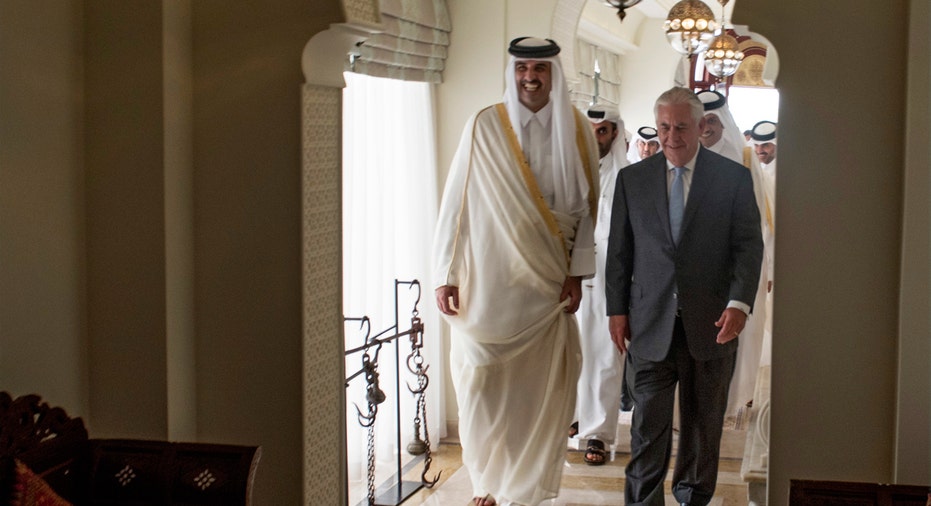Qatar, US reach counterterrorism agreement amid Gulf diplomatic crisis

Qatar agreed Tuesday to enhance its counterterrorism efforts as U.S. Secretary of State Rex Tillerson continued his effort to mediate the tiny Gulf nation’s ongoing diplomatic dispute with neighbors over its perceived support of extremist groups.
U.S. and Qatari officials signed an agreement “outlining future efforts Qatar can take to fortify its fight against terrorism and actively address terrorism funding issues,” said R.C. Hammond, a senior advisor to Tillerson. Discussions on the memorandum took place during Tillerson’s trip in Doha, shortly after a stop in nearby Kuwait.
A coalition of Arab nations, including Saudi Arabia, Bahrain, Egypt and the United Arab Emirates, have accused Qatar of backing extremist groups – an accusation Qatar has denied. The nations cut diplomatic ties with Qatar and blocked key routes into and out of the country in June.
Qatar was Tillerson's second stop on a shuttle-diplomacy circuit that will also take him to Saudi Arabia, which shares Qatar's only land border and is the most powerful of the four countries lined up against it.
Describing himself as a "friend to the region," Tillerson expressed hope for progress in ending the standoff in brief remarks following a meeting with 37-year-old Emir Tamim bin Hamad Al Thani in the sweltering Qatari capital, Doha.
Tillerson also gave besieged Qatar some political backing ahead of talks with officials from the Arab quartet in Saudi Arabia on Wednesday.
"I think Qatar has been quite clear in its positions and I think very reasonable," he said.
Tillerson, a former oilman with years of experience in the oil-rich region, began his Gulf visit Monday by meeting Kuwait's ruler, Sheikh Sabah Al Ahmed Al Sabah.
The Kuwaiti leader has been acting as a mediator between Qatar and the quartet of Saudi Arabia, Bahrain, the United Arab Emirates and Egypt.
The four nations broke off relations with Qatar and cut air, sea and land routes with it in early June. They later issued a 13-point list of demands to restore relations and gave Doha 10 days to comply.
The demands include Qatar shutting down news outlets, including the media network Al-Jazeera, cutting ties with Islamist groups such as the Muslim Brotherhood, limiting ties with Iran and expelling Turkish troops stationed in the country.
Qatar strenuously denies supporting extremist groups and has rejected the demands, saying that agreeing to them wholesale would undermine its sovereignty.
It does, however, at least indirectly support Islamist groups labeled as terrorist organizations, such as the Palestinian militant group Hamas. Qatar has hosted senior Hamas officials on its soil and is the largest financial patron to the Hamas-ruled Gaza Strip. It argues its aid is for the Palestinian people rather than Hamas.
Qatari envoy Mohammed al-Amadi signed a new agreement with a Palestinian contractor to build eight residential buildings in Gaza on Tuesday. He said his country would continue to support development projects in the seaside territory, which Hamas seized from forces loyal to Palestinian President Mahmoud Abbas in 2007.
Tillerson's arrival in the Gulf coincided with the release by CNN on Monday of allegedly leaked agreements between Qatar and its neighbors dating from 2013 and 2014. CNN said it received the documents from a source in the region.
They include a handwritten 2013 deal between the leaders of Saudi Arabia, Kuwait and Qatar to not interfere directly or indirectly in the internal affairs of fellow members of the six-nation Gulf Cooperation Council, which also includes Bahrain, Oman and the UAE.
That agreement specifically ruled out support for the Muslim Brotherhood and other unnamed groups that could threaten the bloc's members.
Qatar sees the Brotherhood as a legitimate political force and has for years hosted its spiritual guide, Sheikh Youssef al-Qaradawi. That puts it squarely at odds with Saudi Arabia, the UAE and Egypt, which see the Brotherhood as a terrorist organization.
The four anti-Qatar countries lent credibility to the leaked agreements in a statement issued early Tuesday. They asserted that the documents "confirm beyond any doubt Qatar's failure to meet its commitments and its full violation of its pledges." Their 13-point list of demands in June was tied to those earlier deals and was "fully in line with the spirit of what was agreed upon," they said.
The head of Qatar's government communication office, Sheikh Saif bin Ahmed Al Thani, disputed that, saying the June demands "bore no relation to the Riyadh agreements," according to a statement carried by the official Qatar News Agency. He called the "siege" by the four states a violation of the GCC charter.
U.S. officials have said Tillerson does not expect an immediate breakthrough in the dispute and cautioned that a resolution could take months.
A senior adviser to Tillerson, R.C. Hammond, has said the demands on Qatar were not viable but that there were individual items on the list "that could work." He did not elaborate.
Qatar is not new territory for Tillerson. Before being tapped to be President Donald Trump's top diplomat, he served for years as CEO of Exxon Mobil.
The Irving, Texas-based oil giant is one of the most dominant players in OPEC member Qatar's energy industry, and played a major role in turning it into the world's largest producer of liquefied natural gas.
The Associated Press contributed to this report.



















